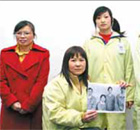People
Russo Jorge, a Macao musician at a cultural crossroads
(Xinhua)
Updated: 2009-12-15 13:44
 |
Large Medium Small |
MACAO: Russo Jorge, leader of the Tuna Macaense band, is toiling to preserve Macao's endangered Patua dialect by incorporating it into popular musical entertainment.
As the group's composer and guitarist, Russo Jorge composed 15 of the band's songs with lyrics in the Macao dialect, known locally as Patua.
| ||||
"It has been largely substituted by Cantonese and Portuguese nowadays," says Jorge, 52.
"Many Macaense of the new generation even don't know about the existence of this dialect."
The "Macaense" culture is woven into the history of Macao, which was under Portuguese rule for about 400 years. "Macaense" is a Portuguese expression for Macao-born Portuguese or Macao-born mixed-blood of Portuguese and Chinese or of Portuguese and other Asian ethnic groups.
In a population of more than 500,000, Macao has more than 10,000 Macaense. Many are civil servants and many others work in the law, accounting and construction.
"I only work out the tunes of these songs. Usually I resort to works written in Patua by the late Macaense poet Jose Ade dos Santos Ferreira as a source for lyrics," he says.
Apart from Macanese songs, the eight-member band can also perform in Cantonese, Portuguese, English, Thai, Filipino and Japanese.
"Our polyglot band is actually just like today's Macao where diverse cultures and people coexist harmoniously," Jorge says.
When the Tuna Macaense stages performance outside Macao, the musicians play more Macao songs to reflect the region's multicultural features.
"In fact, I like diversification very much. Putting Chinese and Portuguese elements together is great," he says.
Tuna Macaense was formed in 1935 and has seen a number of incarnations. In its prime, the band had 30 members, says Jorge.
"I joined Tuna before Macao's return to the motherland when I was still a policeman."
Jorge worked in the police for 22 years and now works as the security operations manager at MGM Grand, a major casino operator in Macao.
All the group's eight members have their own jobs: some in the local postal service or banks, and one member is an employee of the Portugese consulate in Macao.
They practice at the site of the "Associacao dos Macaenses," a non-governmental social organization, in the downtown area of the Macao Peninsula every week. "As we are not professionals, we don't have our own place to practice."
They often perform at the request of fans or under the arrangement of the local tourism bureau.
"The income covers the operational costs of our band," he says. But for Jorge, the promotion of Macao culture is more important.
During the Macau Grand Prix Formula Three race in November, local TV stations aired performances by the band.
"Some Americans asked me what kind of songs they are, because the strange dialect sounds very special to them," he says. "It's much easier for unique things to attract people."
So far, the band has made four discs, and Jorge plans another featuring a collection of his songs next year.
Dressed in vermeil outfits, Jorge and his fellow band members were honored by the chief executive of the Macao Special Administrative Region Edmund Ho Hau Wah in January last year to honor their efforts in promoting local culture and art.
Tuna Macaense is preparing to perform during next year's Shanghai World Expo and at the Asian Games in Guangzhou, capital of southern Guangdong Province.
"We're glad to show what is unique to Macao's culture on a larger stage," Jorge says.










